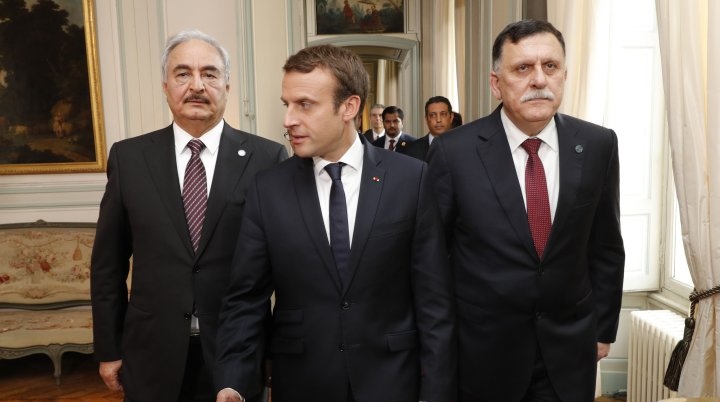Peace in Libya?
July 26, 2017 | Expert Insights

Libya’s two warring leaders, Prime Minister Fayez al-Serraj and the eastern commander Khalifa Haftar have agreed to a conditional ceasefire.
The ceasefire, that was mediated by the French president, Emmanuel Macron, will hold until elections are held in the region next year.
Background
Libya is an oil-rich country in North Africa whose geography is mostly desert land. It has the 10th-largest proven oil reserves in the world.
After being ruled for centuries by Carthaginian, Byzantine and Ottoman empires, Libya was colonized by Italy in 1911. When Italy was defeated during the World War II, the future of Libya was uncertain. Eventually it was decided that Libya would be a monarchy and the rule was handed to Sayyid Idris, Emir of Cyrenaica.
Oil reserves were discovered in 1959 and the nation went from a poor state to a wealthy economy in relatively short period of time. In 1969, a group of rebel military officers led by Colonel Muammar Gaddafi, overthrew the King in a coup. Gaddafi was in power till 2011, when a civil war broke out in the country. This was fought by those loyal to Gaddafi and those who opposed him. This ended with a defeat of Gaddafi’s forces as the armed rebellion had been assisted by Western military intervention. Gaddafi was captured in October 2011 and subsequently died under ambiguous circumstances.
The region has since been plunged into deep chaos. US President Barack Obama has called Libya his “worst mistake” and has regretted not planning for the aftermath of Gaddafi's ousting.
Analysis
French President Macron met with the rival leaders of Libya separately to seek a resolution. Prime Minister Fayez al-Serraj is backed by the UN but it is General Haftar who has the military resources. Macron said that both men have shown “historic courage” in agreeing to the talks.
Macron has said that he is eager to help broker peace back to the nation. A joint statement at the end of the talks read, “We commit to a ceasefire and to refrain from any use of armed force for any purpose that does not strictly constitute counter-terrorism, in compliance with the Libyan political agreement and international treaties, and in order to protect Libya's territory and sovereignty and we strongly condemn all that threatens the stability of the territory.”
Assessment
Our assessment is that this temporary ceasefire is too little to solve the many problems plaguing Libya. The politically fractured region is overrun by militia and is suffering through a human trafficking crisis. It is important for France and Europe to solve the crisis in Libya as it’s a hotbed currently for terror outfits. Much of the anger of the Libyans is against Europe for bombing Tripoli. Many Libyans feel they were living much better under Gaddafi than under the present regime.








Comments